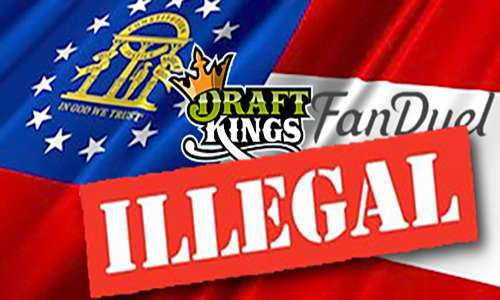Georgia Attorney General’s Office Advises that DFS is Illegal
On Friday, the Georgia Attorney General’s Office issued an opinion stating daily fantasy sports (DFS) are illegal under state law, making Georgia the seventh state in which an AG has ruled this way.
The opinion was prompted by an inquiry from Georgia Lottery Corporation Senior Vice-President and General Counsel Joseph J. Kim, who asked if DFS was “illegal gambling” based on the definition of a “bet” and DFS sites could use the “actual contestant” argument in defending their businesses.
 Deputy Attorney General W. Wright Banks, Jr.’s answer to the first question was pretty straightforward. According to Georgia code, a “’bet’ means an agreement that, dependent upon chance even though accompanied by some skill, one stands to win or lose something of value.”
Deputy Attorney General W. Wright Banks, Jr.’s answer to the first question was pretty straightforward. According to Georgia code, a “’bet’ means an agreement that, dependent upon chance even though accompanied by some skill, one stands to win or lose something of value.”
Banks went on to write, “Participants in daily fantasy sports pay a fee to participate and only a portion of that fee is paid out to the winning participants; the remainder of the fee is taken by the host site. By paying this fee and participating, participants agree to win or lose something of value—a portion of the pot. This clearly constitutes a ‘bet’ within the meaning of O.C.G.A. § 16-12-20(1).”
And because the law says a bet is still a bet even if there is some skill involved, the skill argument doesn’t hold water, according to Banks:
Once their choices are made, participants have no control over the outcome of the simulated games; the outcome of the games is determined solely based upon the performance of others—the actual players in the athletic contests. On any given day, an athlete may become injured, may be ill, may play poorly, may be ejected from the game, may have equipment failure, or may be affected by weather or other factors. All of these circumstances are outside of the control of a fantasy sports participant.
He also cited an 82-year old case, Sparks v. State, in which the court ruled that even if someone became very proficient at a particular game in question through practice, it was still impossible to win every time because of “the action of the machine.” Hence, the game was still one of chance. He compared this to daily fantasy sports where, “a participant whose purported skill level has not changed from one game to the next is just as likely to win one tournament, then lose the next tournament due to the performance of players outside of the participant’s control.”
Then there was the question of the “actual contestant” exception. This phrase appears in the laws of many states; the DFS sites have tried to argue that the DFS participants are the “actual contestants” in the contests and thus are permitted to be paid for their success. Banks shoots this concept down:
That exclusion does not apply to daily fantasy sports. The purpose of the exclusion is to allow athletes competing in the sporting events to be rewarded for their efforts, not for people to receive compensation for betting on the outcome of those events or the performance of a particular athlete. See Grant v. State, 75 Ga. App. 784 (1947) (the Georgia Court of Appeals held that while the players in baseball games have a high proficiency of skill, wagering on whether a particular player would hit a fly ball constituted chance, and thus betting, under former Georgia Code § 26-6502). To read the ‘actual contestant’ exclusion any other way would allow the exception to swallow the rule. Therefore, daily fantasy sports do not satisfy the “actual contestant” exclusion in O.C.G.A. § 16-12-20(1)(B).
The Deputy Attorney General’s opinion is just that – an opinion – and is specifically referred to as “informal advice” in the letter to Joseph Kim. Thus, it appears unlikely, at least right now, that the state will do anything about people playing DFS.
There was a bill introduced in the Georgia State Senate, SB 352, that aimed to specifically legalize and regulate daily fantasy sports, but it has been put on the back burner. The bill was considered a “consumer protection” bill and would have required daily fantasy sports operators to be registered and licensed with the state. Sites would have been required to pay an initial $50,000 licensing fee and an annual fee of $10,000; money would have been earmarked for education initiatives such as the popular HOPE Scholarship program.
The bill’s chief proponent, Sen. Renee Unterman (R – Buford) feels that DFS is a skill game and while she may be right, obviously the Attorney General’s Office does not believe that the presence of skill matters when going by the letter of the law.
The bill was read twice in the Senate (Regulated Industries and Utilities Committee) and did have some support – it had six sponsors – but the latest note on the bill’s legislative page is that it was “Dropped to Foot of Rules Calendar in Senate.”



















COMMENTS